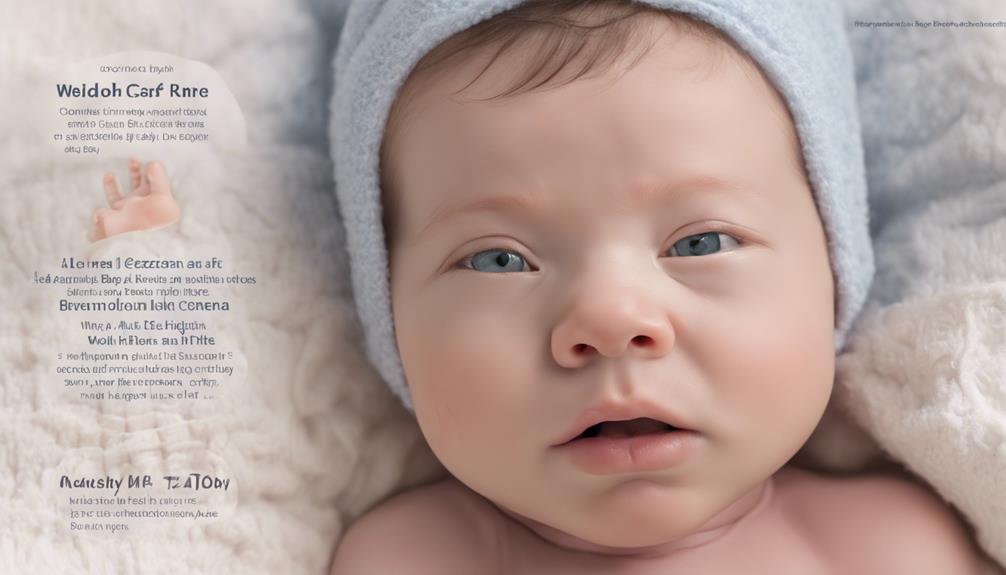Understanding the significance of tender care for a newborn’s skin is crucial to preserving the health of their delicate dermis. It’s essential to cater to the specific requirements of their sensitive skin with a mindful strategy that emphasizes protection and enrichment.
By exploring the nuances of newborn skin care, we can make sure that every touch and product used contributes to a healthy foundation for your little one. Let's set off on this journey together to uncover the secrets of nurturing your baby's skin with the tenderness it deserves.
Key Takeaways
- Use fragrance-free, hypoallergenic products for newborn skin.
- Choose pH-balanced, gentle formulations to maintain skin health.
- Regularly monitor and address common skin conditions like cradle cap and diaper rash.
- Establish a simple skincare routine with mild cleansers and moisturizers.
Newborn Skin Characteristics
Newborn skin, with its unique vulnerability and thinness compared to adult skin, demands specialized care and attention to maintain its health and integrity. As caregivers, we comprehend the delicate nature of baby skin, which is approximately 30% thinner than that of adults. This thinness makes it more susceptible to irritation and moisture loss, emphasizing the need for gentle care and protection.
Infant skin has a higher rate of water absorption and loss, requiring extra vigilance in ensuring adequate moisture levels to prevent dryness and discomfort. Premature babies, in particular, may need additional support, such as daily application of petroleum jelly to reinforce their skin barrier function.
To safeguard newborn skin, it's vital to opt for fragrance-free and hypoallergenic products. These choices help prevent potential sensitivities and reactions, which are common in delicate skin. By using gentle, minimal skincare regimens and selecting products designed specifically for the unique needs of newborn skin, we can promote its health and well-being effectively.
Common Skin Conditions

With their delicate skin being prone to various conditions, newborns commonly experience a range of skin issues that require careful attention and management. Some of the common skin conditions observed in newborns include:
- Cradle cap, also known as seborrheic dermatitis, is identified by yellow crusts or red patches on the scalp.
- Diaper rash affects nearly 3 out of 4 babies and is due to factors like moisture, friction, and bacterial growth in the diaper area.
- Erythema toxicum, a benign condition affecting most newborns, appears as yellowish papules surrounded by red skin and typically resolves on its own.
- Newborn acne, seen in about 20% of babies, presents as small red bumps or whiteheads on the face.
Understanding these conditions can help caregivers provide appropriate care and seek medical advice when necessary. Using gentle baby wipes, zinc oxide-based creams for diaper rash, and ensuring sun protection can aid in managing these skin issues effectively.
Choosing Baby Skin Products
Exploring the world of baby skin products can be overwhelming, but making informed choices is essential for safeguarding your little one's delicate skin. When choosing products for your baby's skin, opt for gentle, hypoallergenic formulations that minimize the risk of irritation and allergies. Look for pH-balanced options to help maintain the natural balance of your baby's skin and prevent dryness.
Fragrance-free products are ideal for newborns as they reduce the chances of skin sensitivities and reactions. Specifically designed baby products for newborns cater to their delicate skin needs, ensuring gentle care. Consider using organic or all-natural products to minimize your baby's exposure to potentially harmful chemicals.
Baby Skincare Tips

When caring for your baby's delicate skin, it's crucial to prioritize using fragrance-free and hypoallergenic products to minimize the risk of irritation and allergies. It's vital to be gentle and mindful of your baby's sensitive skin to prevent any skin problems.
Here are some baby skincare tips to help you maintain your little one's skin health:
- Diaper Rash Prevention: Regularly change your baby's diaper and use a barrier cream to protect their skin from moisture and irritation.
- Gentle Cleansing: Use a mild, fragrance-free cleanser to bathe your baby, especially focusing on the diaper area to prevent any skin conditions.
- Sun Protection: Shield your baby from harmful UV rays by applying mineral sunscreen when going outdoors to safeguard their delicate skin.
- Consultation for Skin Issues: Seek advice from a pediatrician or dermatologist if you notice any concerning skin problems or persistent rashes on your baby's skin.
Establishing a Skincare Routine
To establish a skincare routine for your newborn, prioritize using gentle, fragrance-free products designed for their delicate skin. Opt for mild baby wash during bath time, and remember to cleanse gently with lukewarm water to avoid stripping natural oils. After bathing, apply a gentle baby lotion or oil to keep your little one's skin moisturized and protected. It is crucial to monitor your newborn's skin regularly for any changes or signs of irritation. If you notice any concerning issues, seek medical advice promptly to address any skin conditions that may arise.
| Skincare Routine Tips | Details |
|---|---|
| Use fragrance-free products | Minimize risk of skin irritation |
| Gentle washing | Cleanse with mild baby wash and lukewarm water |
| Apply baby lotion | Keep skin moisturized and protected |
| Monitor skin changes | Regularly check for any concerns or skin changes |
Frequently Asked Questions
What Skin Care Products Do Newborns Need?
We believe newborns need gentle, fragrance-free, hypoallergenic products to avoid skin irritation. Petroleum jelly helps strengthen the skin barrier and provide essential moisture. Johnsons CottonTouch™ and Head-To-Toe® collection offer baby wash and lotion suitable for delicate skin needs.
What Can I Put on My Newborn's Skin?
We recommend using gentle, fragrance-free products designed for newborn skin. Consider options like Johnsons CottonTouch™. Daily application of petroleum jelly can help strengthen the skin barrier. Avoid sunscreen on infants under 6 months; seek medical advice for persistent skin issues.
Can I Put Lotion on My 1 Week Old Baby?
We can apply gentle, fragrance-free lotion to our 1-week-old baby, sparingly on dry patches, avoiding sensitive areas. It's important to consult our pediatrician and choose products designed for newborns to prevent skin issues.
When Should I Start Moisturising My Newborn?
We start moisturizing newborns when their skin looks dry or flaky, usually a few weeks after birth. It is crucial to use gentle, fragrance-free lotions on sensitive areas like elbows and cheeks. Natural oils like coconut or almond are great choices.
Conclusion
To summarize, caring for newborn skin requires special attention and gentle products.
Did you know that a baby's skin is about 30% thinner than an adult's, making it more susceptible to irritation and dryness?
By following a proper skincare routine, choosing the right products, and staying informed, you can help keep your baby's skin healthy and protected.
Remember, their delicate skin deserves the best care possible.









